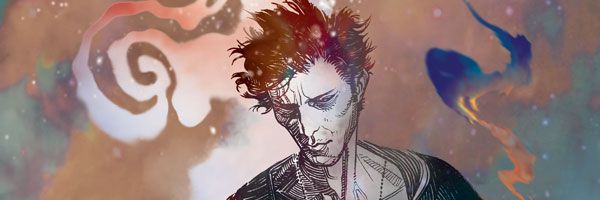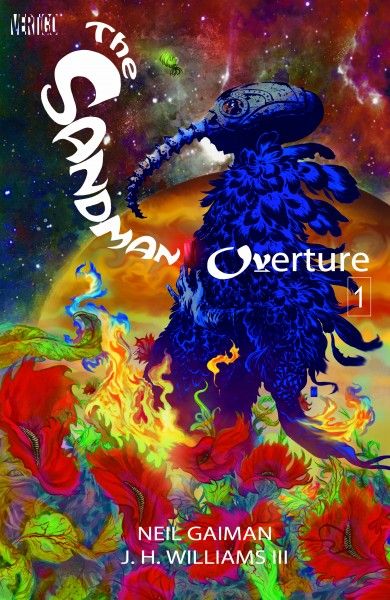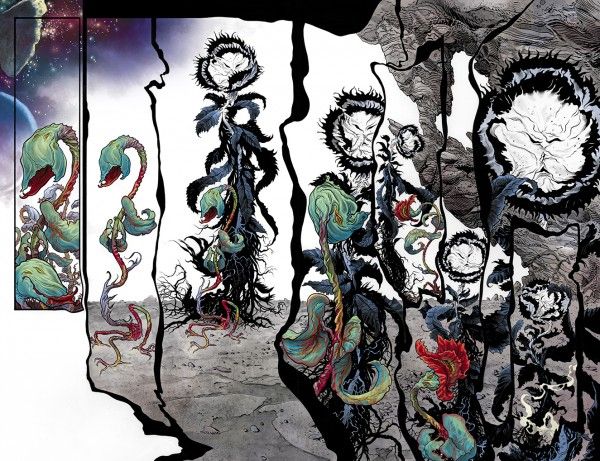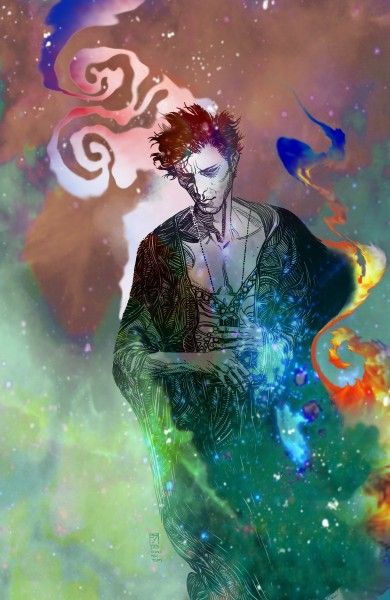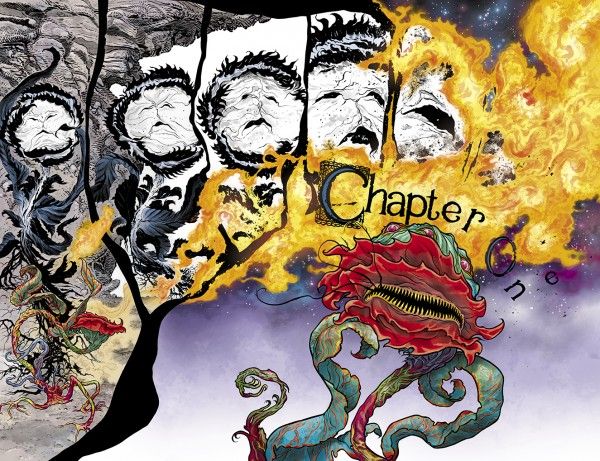The first time I read a Sandman comic was a revelation. I had never read a comic so ambitious, so beautiful, and so damn deliciously dark. I was hooked and I was not alone. At that time the series had already been running strong for ten years, and every comic fan I knew cited it along works like Watchmen and Arkham Asylum as one of the key pieces that redefined their concept of what comic books could achieve. Being not only a huge fan of Sandman, but also of Gaiman’s work as a novelist, It was an absolute honor and privilege to have the opportunity to meet and speak with him about the return of Morpheus in the upcoming prequel The Sandman Overture.
In anticipation of their Comic-Con panel, Neil Gaiman and J.H. Williamson III met with the press to discuss the soon to be released comic. They talked about the return to the Sandman universe, their collaboration, how the fan base has grown over the years, the pressure of working for such a broad audience, creating a prequel to a work that spans four billion years, and more. Hit the jump to check out what they had to say and take a look at some art from the upcoming series.
Gaiman was first asked what it was like for him returning to the Sandman universe after all these years:
It’s really fun actually. It’s nerve wracking. It’s definitely a peculiar sense of terror. When I started doing sandman I didn’t know if anybody would be interested. I was basically writing it for me…and very quickly I found that I was writing for about 40,000 people and then I was writing 50,000 people and then 100,000 people. And that was still nice, that was still Okay. But there was a level at which you go, “the world population is huge and there’s 120,000 people who know about my comic” and that’s a tiny, tiny part of the population, but it made me happy. And even toward the end when we were outselling Batman and Superman, I was saying, “It’s only a little thing, and it’s nice.” And then a few years had gone by and the graphic novel collections have sold more and more with every year that’s gone by... I’ve asked DC how many copies we’ve actually sold, because we’ve got this figure of 7 Million that I’ve seen a few times, but I was saying, “Guys, those 7 Million graphic novel figure is the one that you rolled out in 2003.” And we’ve sold a fuck of a lot of books since 2003. No one’s every actually sat down and counted all this and we don’t actually know how we’d count, because are you counting comics? Are you counting books? Are you counting collections? And none of us really know, but the upshot of all that is that 25 years after I started writing a comic that I didn’t know if anybody was going to read and that I thought would probably be cancelled at issue eight…that’s all changed. Now I’m doing it for millions of people and in my head they’re all looking over my shoulder as I write. And they’re all going, “this better be worth waiting for. This better be good.” And there’s millions of them.
Is it hard for Gaiman not to let that kind of audience pressure sway the way he tells the story?
It’s a little bit difficult. There was a point writing Sandman. It was about issue 8 that I had to make a big decision because the most popular thing I had done at that point was Sandman #4. People had loved going to hell they loved facing off against Lucifer…Fan mail on that was happy and thrilled, and I had a storyline that was going to be called Season of Mists and I knew that that was going to be Morpheus going to hell, facing off against Lucifer. It was going to be cool, fans were going to love it, and I thought “Okay I have a choice. I can do that story that everybody is going to love or I can do this thing in my head called The Dolls House and I don’t know if anybody is going to like that at all. It’s nothing like anything that’s been before…it’s different. And I went “Okay I’m going to do the thing that I don’t know if the fans are going to like and we’ll find out.” That’s what I did, and in some ways that became in some ways a kind of wonderful model for me for the rest of Sandman because it meant that I was actually allowed to do things that fans didn’t like.
He cited his work on The Kindly Ones as a primary example:
With The Kindly Ones I made some specific decisions including the fact that I’m not going to do those kind of elegant hidden recaps so when you pick up the issue having not read it for a month I’m going to reorient you to where we are in the story and I’m going to remind you because you haven’t read this thing in a month. Instead I’m just going to bang you straight on in…you lot are just going to have to cope with that. And I did The Kindly Ones and the reaction was, “This is the worst thing you’ve ever done.” And then I love the fact that the graphic novel format of The Kindly Ones gets the highest number of Amazon stars of any of the books. Because it works if you just sit and read it from beginning to end. The philosophy of Sandman has always been – you do the shit you think is right and hope that people go along with. Here I am 25 years later and that’s still the governing philosophy. I’m going to try and do the thing that is the right thing to do and tell my story and tell it honestly and try not to fuck it up and try not to blow any deadlines and try to give JH Williams amazing things to draw.
Williams is also feeling the pressure of expectation as he attempts the balancing act of honoring the Sandman universe that came before and bringing his own style to it:
That’s a very challenging thing for me and I am feeling the pressure, probably more so on myself than anyone else is putting on me because I want to do the series justice, I want to do Neil’s writing justice. It’s a weird thing because it’s a prequel, but at the same time in some ways it still needs to feel like now. So how do we walk the line of being a prequel, but still feeling relevant and fresh today on a visual level? That’s been very challenging, but I think so far we’re doing okay. As a creator and artist that’s definitely on my mind.
Gaiman spoke of why he chose Williams and their work together thus far:
I read Promethea and I loved it. So that was my first introduction…There was this one issue that was a Mobius strip where you were expected to cut out the pages and tape them together and you could have read them like that where I thought, “Okay, JH is actually as mad as Allan [Moore]” Allan gives him something impossible to do and he’s willing to go with it. For me the joy so far, it’s still early days for me and JH on this thing, is every time I ask him to do something impossible he does it.
For Williams the collaboration has been a great experience:
It’s been fantastic. He’s a very warm individual. The first time I got to speak to him on the phone we had a long conversation. I was so nervous because he was somebody I always looked up to and I was a great admirer or his work and he was so easy to talk to, so gracious, happy to have me on board and that made it really nice. We’ve been easy to connect right away.
When asked about his visual approach the Sandman world Williams said:
For lack of a better term it’s a bit sporadic because I’m trying to bring different qualities to each scene to make them distinct and with Sandman, since he’s the lord of dreams and it’s about stories and how stories can make you feel I want to make sure that each scene has this emotional beauty to it.
Was it difficult for Gaiman to reconnect with the story and maintain the same tone?
The characters are still there and the characters sound like themselves. They’re as much fun as they ever were…That’s the joy and that’s the challenge. Did you feel that the 42 Neil who wrote Endless Nights was writing the same characters as the 26 year old Neil who started writing them in Sandman #1? If you did then I think we have a good chance.
When asked what’s different about Morpheus as we see him in the past, Gaiman Joked:
Short hair.
Gaiman also commented on why he doesn’t see this as a true prequel:
The truth about Sandman is that in some ways when we wave the word prequel around we confuse the issue because Sandman, as a story, stretches from approximately four billion years ago…and it goes until approximately 2003-2004. In Sandman itself we go from mythical times, to Roman times, to the French Revolution – So it’s not like we have a time zone where we’re saying, “We’re going before that,” because we’ve already been before that. What we’re doing here is simply telling a story that happens in 1916 and some parts of the story happen outside of 1916…so I don’t think of it as a prequel. I just think of it as that Sandman story that I would have love to have told that just didn’t fit into Sandman 1-75.
Everyone on board seems confident and happy to be there, and considering the knockout year Gaiman is having so far, I’m feeling pretty hopeful that The Sandman Overture will be a killer addition to the world that fans have come to know and love. You can look forward to taking Morpheus home again this October 30th.

